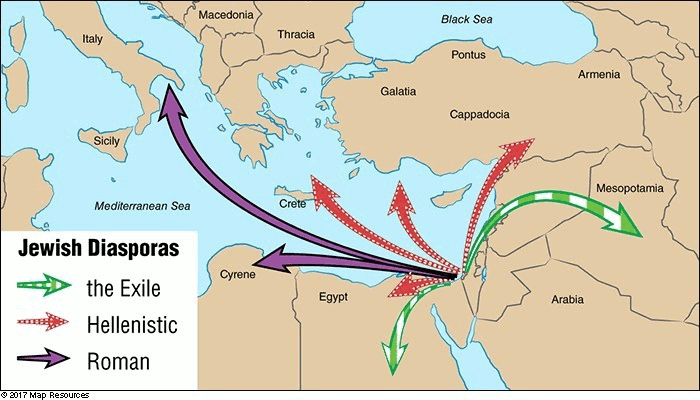
Diaspora
I’d like to talk about the way in which the Jewish Diaspora has shaped the culture of modern Judaism of all sects.
Background
A Diaspora is when people from a “native” country emigrate to a foreign country in large enough numbers that they are able to maintain their original culture in their new homeland. Generally, they maintain that original culture either in addition to or in complete replacement of the culture of the country that they now reside in. Naturally, the lack of complete adoption of the culture of their new country and insistence on maintaining at least a fragment of their original culture tends to generate tense relations between themselves and the rest of the population of their new homeland.
Diasporas have happened many times in history, and the Jewish diaspora is perhaps the oldest and most persistent of those. Here I will argue that the Jewish Diaspora has come to shape the culture of Judaism as it is practiced today in a number of ways, some of which are counter-productive to the current nature of the Jewish people. I am not at all attempting to cast judgement on our ancestors who created this Diaspora and shaped this culture – they were there and I was not, so I can only charitably assume that they did what they needed to do in order to survive, and it worked because our culture did survive. I do however think that it is fair in the modern day to pull these assumptions and cultural impacts out of the depths of our mindsets and shine a light onto them to examine to what extent they are beneficial to our current society. If they are still beneficial, then all is well and good and we can continue to follow them in good conscience; if they are in fact detrimental, then it’s about time that we abandoned them.
Our Culture
We Jews have been Diaspora communities in a great number of places and for a long time. Many of those places and times have not been nearly as friendly to us as the modern-day Anglosphere has been. As such, we have developed a number of successful techniques for how to persist as our own communities in hostile spaces for as long as possible. Here are some of those beliefs as I have noticed them:
- Support for immigration, specifically arbitrary immigration. We want to always allow our fellow Jews to come into the new country in higher numbers. We are also afraid to openly claim that we are superior to other types of potential immigrants and so should be given priority over them. We suspect that such claims will be used by our host nations to paint us as arrogant and will tend to instigate fights with other immigrant communities, leading to a no-win situation where the host nation may dismiss all of us.
- Urge to appear harmless. We avoid any attempt to do violence or otherwise flout the law ourselves, even in our own defense, as to appear potentially dangerous to our host nation is far more dangerous to our diaspora society than any individual acts of violence committed against us. We don’t dare bring down large-scale retribution against ourselves. We instead attempt to integrate ourselves into the existing legal framework of our host society and leverage it as far as possible to defend ourselves. See this essay on The Shtetl Mentality that makes some of the same points I am making here.
- Moral flexibility. Success and status in our host society is all-important, particularly when we have been excluded from the most high-status and lucrative professions, either explicitly in law or implicitly by the clannishness and prejudices of those who already have those positions. There is always a subset of any people who are willing to behave immorally, but those who do so seem to be unusually well tolerated in our culture. Particularly if any harm caused by their behavior is not against our people.
- Clannishness. We have developed a strong tendency to stick together and support each other no matter what, and to be suspicious of and sometimes even exclude outsiders from much of our subculture. We do need to do this at least to some extent in order to actually preserve our Jewish culture, especially when the nation’s primary culture is dominant and tends to proselytize heavily.
Let’s Examine!
Regarding support for immigration, despite the understandable historic value, I don’t think that it has aged well in our modern hyper-connected world, with far easier movement around the globe than ever. With the combination of easy movement around the world, social safety nets, strong legal protections for fully legal workers, and the demand from business for cheaper labor, we find ourselves in a situation where the Western nations are drowning in people who have very different cultures from theirs and who have no interest in adopting their culture. Our fears of the past seem rather speculative these days compared to the issues caused by unchecked third-world immigration, and considering that we do also now have the homeland of Israel to escape to if needed, I think it’s long past time that we got away from the advocacy of permissive immigration.
On the urge to appear harmless, I don’t think this is causing any harm to our larger society. I do however find myself repulsed by what it does to our culture. As the saying goes, the society that separates its scholars from its warriors will have its thinking done by cowards and its fighting done by fools. Violence, ugly as it may be, is a fundamental part of our world. To shy away from it even when fully justified and necessary only leads us to ridiculous thoughts that I think lead to contempt among sane people – like it being more morally pure somehow to allow a savage murderer to kill your child rather than to wield justified lethal force in self-defense.
We are blessed to be part of a society that respects the right of self-defense and the right to keep and bear arms, including when we practice them, and I believe we should abandon any such thought patterns and embrace those rights, or evacuate from any society where that is not possible to safer nations. We have many such places to go to now, and can easily go to most of them; there is no need to shy away for fear of some larger-scale retribution. As such, to the extent that our Synagogues in America actually are in danger, I think they should be protected by armed members of the congregation first, rather than by outside forces such as law enforcement or security contractors.

On moral flexibility, while I can see why it was needed even in our society only a lifetime or two ago, and at least some of it is probably beneficial, it is probably better now if we at least try to back off on such things a little. Since we now have a homeland we can go to if we ever really need to, I think a corollary of that is that if we choose not to move there, we should more openly embrace being fully a part of the societies in which we live. I don’t think it’s enough of a problem to make some big proclamation about, but maybe we should try a little bit harder to keep in mind that we are part of society and we should be less permissive of those who do it any type of harm, even if they are our people.
This ties in somewhat with the clannishness. While Reform Jews have largely abandoned this, other sects, such as the Orthodox and Hasidim embrace it much more wholeheartedly. We basically already have a spectrum of behavior. I don’t see this as a big problem right now. Maybe the Hasidim’s levels of clannishness are a bit distasteful to some of us, but they seem basically harmless, kind of like the Amish.
Conclusion
For those who my words reach directly, I hope you consider these thoughts and, if you currently believe any of these things, even at a nearly subliminal level, you at least consider why it is you actually believe them and whether it’s time for a change, as I have described.
You might also one day find yourself in a conversation with somebody Jewish who seems to express these beliefs. If you have a sufficiently good relationship with them to discuss these subjects and an appropriate temperament, you may find it useful to pause and bring up the subject of how our diaspora past has affected our thinking and, as I said above, whether these principles are still serving us well in today’s world.